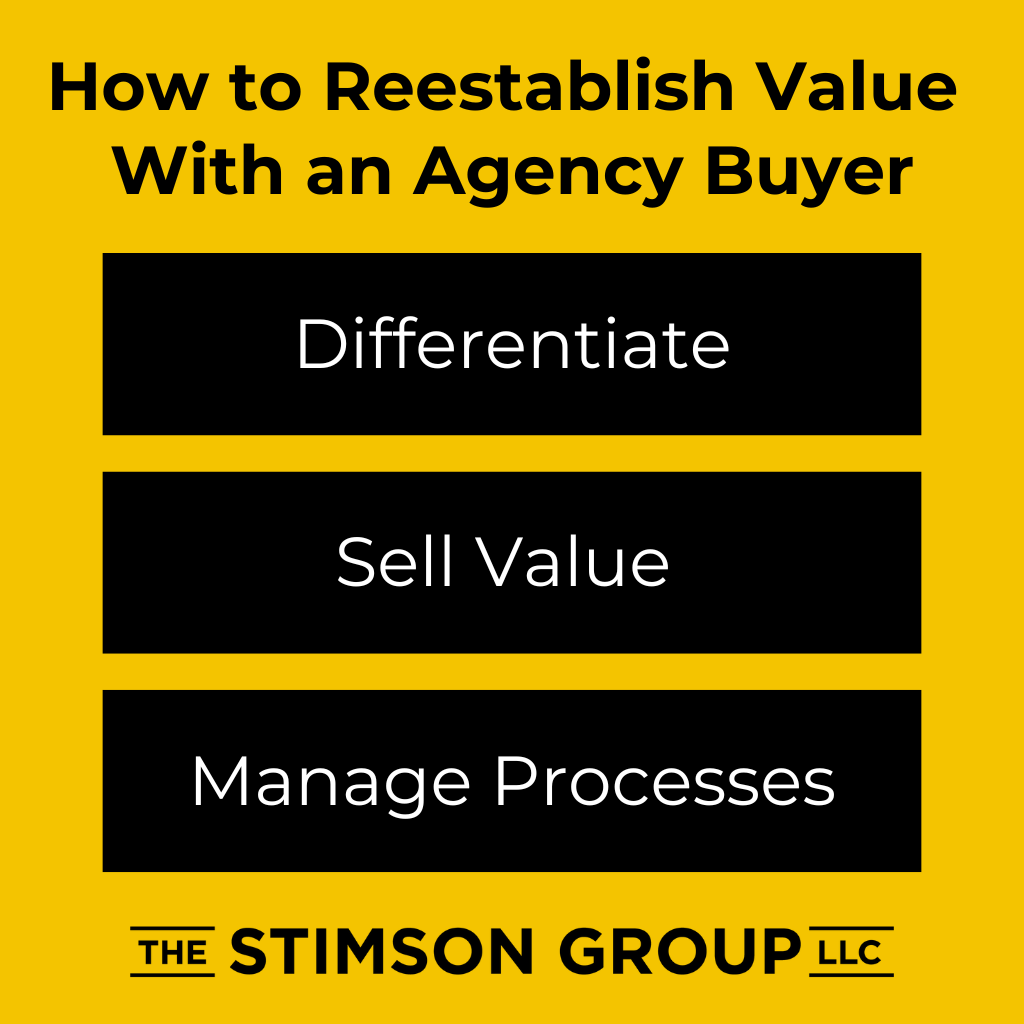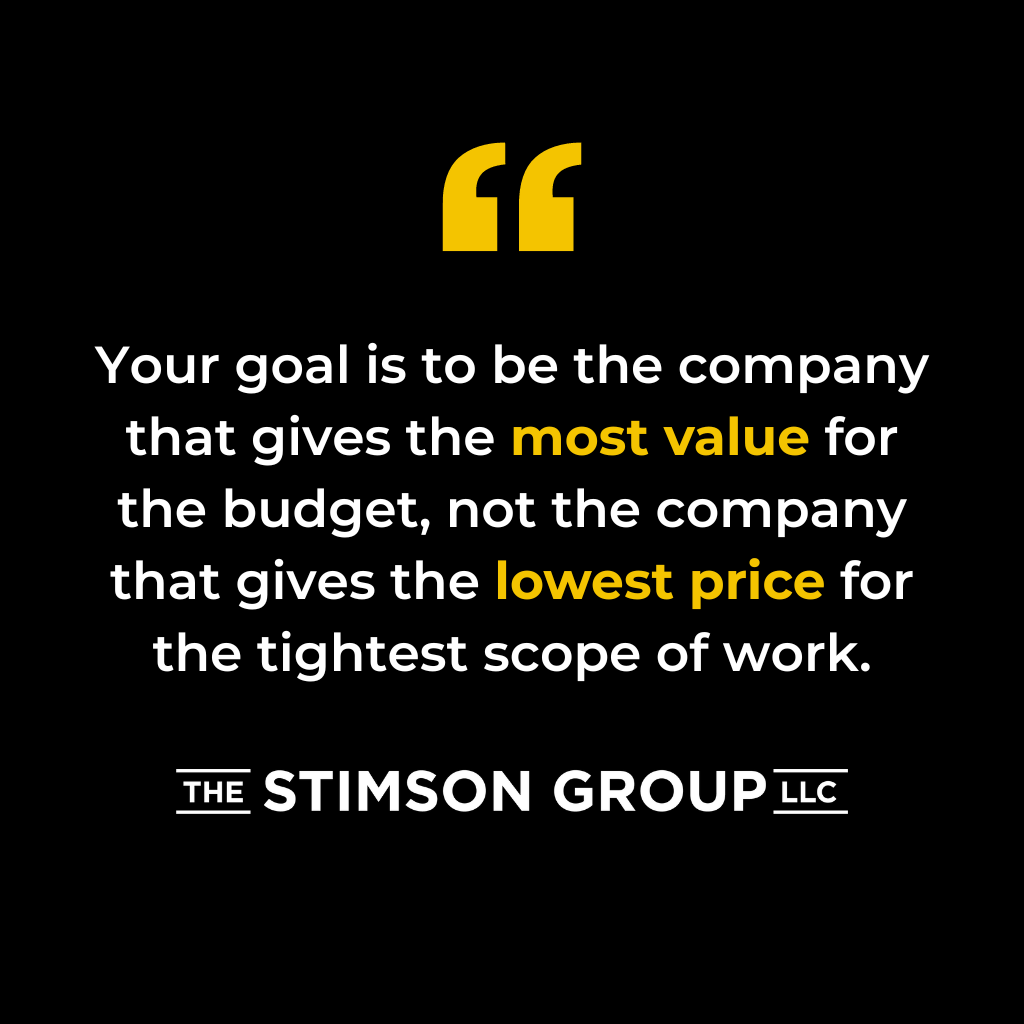
You know the story.
IBM hires an agency to produce its “International Sales Awards” extravaganza. To produce the event, that agency needs a technical support production company — just like yours.
The salesperson at your production company hears the household name “IBM” and forgets all about the agency. They forget that they’re not working for IBM; that the agency is an agent of IBM.
The agency’s job is to spend IBM’s money as carefully as possible. The less the agency spends on a technical support production company like yours, the more money they make for themselves.
Knowing that, what is the agency actually looking for?
What Agencies Want
Agencies are looking to maximize their spending power. They’re looking for a production company that owns its own equipment, has its own people on staff, and doesn’t need to subcontract substantial portions of its business.
Agencies want everything under one roof. They want one invoice so they can leverage one price, because you own all the equipment and you have all the necessary people on staff. The agency believes you’ll give them the best possible price because you’ll absorb some of your own profit margins for a chance to win the job.
If your business regularly has to subcontract, doesn’t own a big LED wall, or doesn’t have a top audio engineer on staff and has to outsource, the agency might be okay with that. But they’re not going to let you turn those things into a profit center.
The fact is, that’s the agency’s job — to keep you from spending money they have to pass on to their customer, which in this case is IBM.
If there’s an agency involved, they’re probably expecting you to be at the bottom of the food chain. They don’t care if you hire some stagehands or a few freelancers here or there, but the fact of the matter is, the buck stops with you.
How can you avoid this? Scalability.
Your scalable business model doesn’t have value for an agency shopping based on price. Your scalable business translates into you building gross profit into everything you do. The agency can’t say, “Well, that’s just sitting on your shelf. Why don’t you give it to us for free?”
What Happens Next
One of two things can happen next.
- The agency says, “Oh, these guys are scalable. We can’t leverage them. We’ll find somebody who isn’t scalable so we can squeeze them for a larger scope and less money.” Will they get the performance, required support, or quality they need? Maybe not.
- The agency says, “We need a good partner. Let’s make room for this production company even though they’re going to charge a little more. It’ll be worth it, because we’ll have less to worry about.”
An Example
A few years back, I did some strategic planning with a company that had pre-planned its entire business strategy around doing government work, because it seemed all its jobs were government jobs.
After closer examination and a few uncomfortable questions, we found out that not a single government agency had ever written that business a check. All those government clients came to them through agency clients.
Their production company was one that agencies came to for exactly the reasons I described above: they owned all their own equipment, had their own staff, and were located in a low-overhead part of the country. Agencies could squeeze them for a better price.
Here’s how I helped that client reestablish their value and work their way up from the bottom of the food chain.

How to Reestablish Value With an Agency Buyer
Differentiate
Position your business as a company that works primarily, if not exclusively, with quality agencies.
Claim the channel by saying, “We only work with agencies. Agencies are our best customers. We don’t work directly with end clients. We want you to have that business, and we’re here to support you.”
Take yourself out of the competitive food chain and make it clear that you’re a partner.
Sell Value
Change the conversation from price to budget.
I like to tell agency clients, “I can give you a lot more value if you’ll tell me what you want to spend. If I have to guess what you’re willing to spend, I’m going to withhold value. My best clients tell me what their budget is, and I make sure they get as much bang for their buck as possible.”
The value is for the agency buyer. If the agency buyer is asking you to bid, they’re asking you to guess the price. This should tell you that you’re not a partner and you’re not the only one looking at the RFP.
Your goal is to be the company that gives the most value for the budget, not the company that gives the lowest price for the tightest scope of work.
Manage Processes
The reason you’re so successful is that you’ve developed processes that work in this kind of relationship.
Because you’ve differentiated yourself as a company that works almost exclusively with agencies, you’ve made it clear you’re focused on value instead of price. Now, show the agency how you’ll support them through your tried-and-true processes.
An established process will include managing scope creep, capturing change orders, and getting paid on time.
Do you have a heavy-hitter salesperson that your best agency clients love to go to? Make sure that Account Manager isn’t going around your processes for the buyer. That undermines all your efforts to establish value. The value to your customer becomes that relationship, and the benefit is lower prices and more “value-added” services.

Conclusion
If you’ve been successful with agency buyers in the past, make sure it’s not because you’ve been slashing prices to keep them buying more.
Make sure you understand the channel to which you’re selling. If you’re selling to agencies, put more energy into differentiation, selling value, and managing processes. Then, you’ll become a go-to company.





Leave a Reply